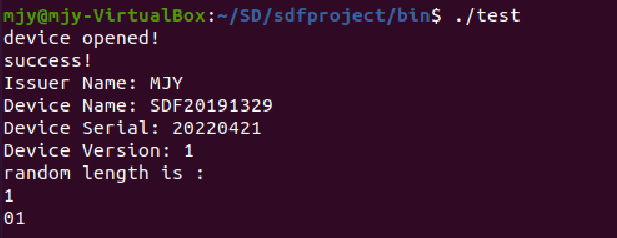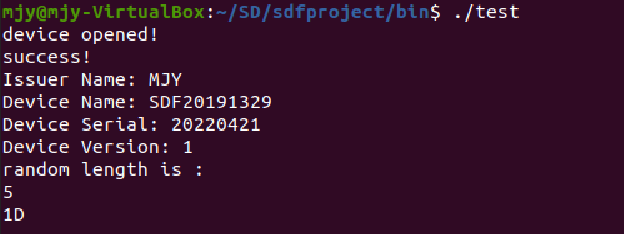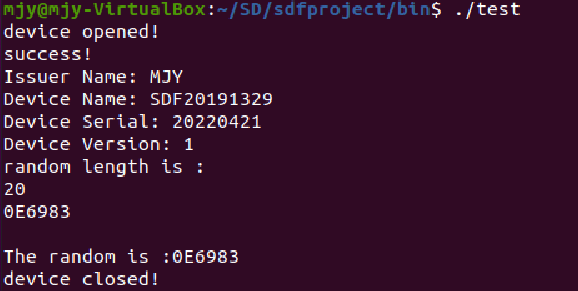OpenSSL测试-随机数
任务详情
0. 在openEuler(推荐)或Ubuntu或Windows(不推荐)中完成下面任务
1. 使用OpenSSL定义一个私有函数 static int getRandom(char *r, int length), 获取length个字节的随机数(5‘)
2. 把上述函数集成到src中的sdf.c中的SDF_GenerateRandom中(5')
3. 在test中的main.c调用SDF_GenerateRandom进行测试,至少测试1个字节,5个字节,20个字节三种情况。(5‘)
4. **提交代码(或代码链接)和运行结果截图**
sdf.h
点击查看代码
#ifndef __SDF_H
#define __SDF_H
//定义设备信息结构
typedef struct DeviceInfo_st{
unsigned char IssuerName[40]; //设备生产厂商名称
unsigned char DeviceName[16];
unsigned char DeviceSerial[16];
unsigned int DeviceVersion;
unsigned int StandardVersion;
unsigned int AsymAlgAbility[2];
unsigned int SymAlgAbilty;
unsigned int HashAlgAbility;
unsigned int BufferSize;
}DEVICEINFO;
// Error Code
#define SDR_OK 0x0 //操作成功
//********************************
//设备管理
//********************************
/*
功能:打开密码设备。
参数∶
phDeviceHandle[out] 返回设备句柄
返回值∶
0 成功
非0 失败,返回错误代码
*/
int SDF_OpenDevice(void ** phDeviceHandle);
/*
功能∶关闭密码设备,并释放相关资源。
参数∶
hDeviceHandle[in] 已打开的设备句柄
返回值∶
0(SDR_OK) 成功
非0 失败,返回错误代码
*/
int SDF_CloseDevice(void *hDeviceHandle);
/*
功能∶获取密码设备能力描述。;
参数∶
hSesionHandle[in]与设备建立的会话句柄
pstDevceInfo [out]设备能力描述信息,内容及格式见设备信息定义
返回值∶
0(SDR_OK) 成功
非0 失败,返回错误代码
*/
int SDF_GetDeviceInfo( void * hSessionHandle,
DEVICEINFO * pstDeviceInfo);
/*
功能:获取指定长度的随机数
参数:
uiLength[in] 欲获取的随机数长度
pucRandom[ out] 缓冲区指针,用于存放获取的随机数
返回值∶
00(SDR_OK) 成功
非0 失败,返回错误代码
*/
int SDF_GenerateRandom (void * hSessionHandle, unsigned int uiLength, unsigned char * pucRandom);
#endif
sdf.c
点击查看代码
#include "sdf.h"
#include <string.h>
#include <time.h>
#include <stdlib.h>
#include <openssl/bn.h>
#include <stdio.h>
//********************************
//设备管理
//********************************
int SDF_OpenDevice(void ** phDeviceHandle){
return SDR_OK;
}
int SDF_CloseDevice(void *hDeviceHandle){
return SDR_OK;
}
int SDF_GetDeviceInfo( void * hSessionHandle, DEVICEINFO * pstDeviceInfo) {
DEVICEINFO di;
strcpy(di.IssuerName,"MJY");
strcpy(di.DeviceName,"SDF20191329");
strcpy(di.DeviceSerial,"20220421");
di.DeviceVersion = 1;
//...
//pstDevicelnfo = &di;
*pstDeviceInfo = di;
return SDR_OK;
}
static int getRandom(char *r,int length)
{
srand((unsigned)time(NULL));
return rand();
}
int SDF_GenerateRandom (void * hSessionHandle,unsigned int uiLength,unsigned char * pucRandom)
{
BIGNUM *bn;
int i;
bn = BN_new(); //生成一个BIGNUM结构
//int bits = 20;
int top = -1;
int bottom = 1;
BN_rand(bn, uiLength, top, bottom); //生成指定bits的随机数
char *a = BN_bn2hex(bn); //转化成16进制字符串
puts(a);
printf("\n");
for(i=0;*(a+i)!='\0';i++)
{
*(pucRandom+i)=*(a+i);
}
*(pucRandom+i)='\0';
BN_free(bn); //释放BIGNUM结构
return SDR_OK;
}
main.c
点击查看代码
#include "sdf.h"
#include <stdio.h>
#include <stdlib.h>
int main(){
void ** pdh;
pdh = (void **) malloc(20);
int ret;
ret = SDF_OpenDevice(pdh);
if(ret != SDR_OK)
{
printf("error!");
} else
{
printf("device opened!\n");
}
DEVICEINFO testdi;
ret = SDF_GetDeviceInfo(pdh, &testdi);
if(ret != SDR_OK)
{
printf("error!");
}
else
{
printf("success!\n");
printf("Issuer Name: %s\n", testdi.IssuerName);
printf("Device Name: %s\n", testdi.DeviceName);
printf("Device Serial: %s\n", testdi.DeviceSerial);
printf("Device Version: %d\n", testdi.DeviceVersion);
printf("random length is :\n");
int m;
scanf("%d",&m);
char string[100];
ret = SDF_GenerateRandom(*pdh,m,string);
if(ret != SDR_OK)
{
printf("error!");
}
else
for(int i=0;i<1;i++)
printf("The random is :%s\n",string);
ret = SDF_CloseDevice(*pdh);
if(ret != SDR_OK)
{
printf("error!");
}
else
{
free(pdh);
printf("device closed!\n");
}
}
}
运行截图
-
1个字节

-
5个字节

-
20个字节



